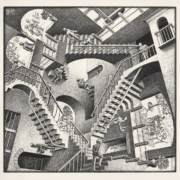Why “¿Authority?” Observations on the Authority/Power Continuum
Abstract
The title of this work refers to the title chosen by the EPF (European Psychoanalytical Federation) for their congress in Berlin in March 2016 (¿Authority?) and references the themes that were chosen by Serge Frisch, Laurence Kahn and Leopoldo Bleger for a seminar they organised, also in Berlin, in September 2014 (Psychoanalysis in 2025). The questions that underlie these initiatives are numerous. Given the scope of this text, I’ll limit myself to pointing out the question that seems to me the most interesting: what can psychoanalysis offer for the understanding of a topic of such great social relevance as authority?
The following work begins with a series of two hypotheses.
The first assumes that authority and power are not substantially dissimilar manifestations, but constitute the poles of an unbreakable continuum. It is difficult to come across an authority entirely devoid of power, just as it is rare for the power of a subject, group or institution not to come with a certain amount of authority (of course, these terms require precise definitions that will be discussed in the next section).
The second hypothesis postulates that the problem of authority, despite being rarely discussed directly in psychoanalysis, is variously reformulated in several conceptual models that develop essential aspects of psychoanalytic theory and technique (it refers, as we shall see, the effects of the conflict between generations and the development of the Oedipus complex on psychic functioning: the formation of the super-ego and his ordinary and extraordinary maintenance).

